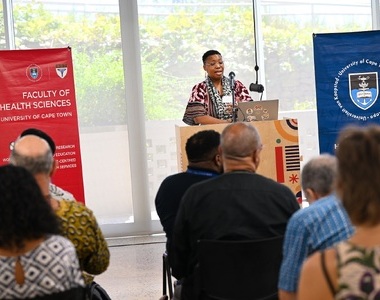WEF names Pityana as co-chair of its Africa board
31 January 2020 | Story Supplied. Photo Supplied. Read time 3 min.
South African business leader and the University of Cape Town’s (UCT) Chair of Council Sipho M Pityana has been appointed the co-chair of the World Economic Forum’s (WEF) prestigious new Africa Regional Stewardship Board (RSB).
The RSB is a multi-stakeholder group that will provide strategic advice to shape the forum’s regional programme in Africa. It comprises eminent leaders on the continent, including African government ministers, business leaders, leaders of regional organisations, and civil society organisations. An immediate task for the RSB is to deliver on the Africa Growth Platform (AGP), which was launched at the World Economic Forum on Africa 2019 in Cape Town.
Pityana, who is president of Business Unity South Africa and chairman of AngloGold Ashanti, co-chaired the World Economic Forum on Africa 2019 and participated in the conceptualisation of the AGP. He will co-chair the RSB with former vice-president of the World Bank for Africa, Dr Oby Ezekwesili.
“I’m honoured and humbled by this opportunity,” said Pityana. “I look forward to working with like-minded stakeholders to achieve greater African economic integration while addressing environmental, sustainability, governance and human-capital shortcomings in Africa.”
The AGP aims to address Africa’s job creation crisis by scaling 100 million small and medium-sized enterprises and start-ups across the continent by 2025, bringing together governments, investors and entrepreneurs to enhance funding prospects, create better enabling environments for business growth and help Africa’s community of start-up enterprises grow and compete in international markets.
“I look forward to working with like-minded stakeholders to achieve
greater African economic integration.
It aims to do this by:
- securing commitments from governments to implement policy reforms aimed at stimulating and accelerating business growth
- building a community of investors, whether private investors, foundations, multilateral institutions or corporate entrepreneurs to enable better coordination and pooling of resources that could facilitate larger subsequent rounds of funding
- creating and sustaining a community of start-up businesses themselves, promoting collaboration and sharing best practices.
Underpinning this year’s WEF meeting will be the Davos Manifesto 2020, which provides a vision for stakeholder capitalism that touches on a range of important issues of our time, including sustainable and inclusive economic growth, climate crisis and zero tolerance for corruption.
In the spirit of the Davos Manifesto 2020, the forum is launching the Davos Friends of AGP community to mobilise the global community for collective action to meet the 100 million by 2025 goal for this business-led initiative.
“The AGP is a living example of how this approach can be used to take an industry cluster slant that brings stakeholders together to enable specific interventions that can significantly improve the ability of businesses within target sectors to grow and create jobs,” said Pityana.
 This work is licensed under a Creative Commons Attribution-NoDerivatives 4.0 International License.
This work is licensed under a Creative Commons Attribution-NoDerivatives 4.0 International License.
Please view the republishing articles page for more information.






























































































































































































































































































































































































































































